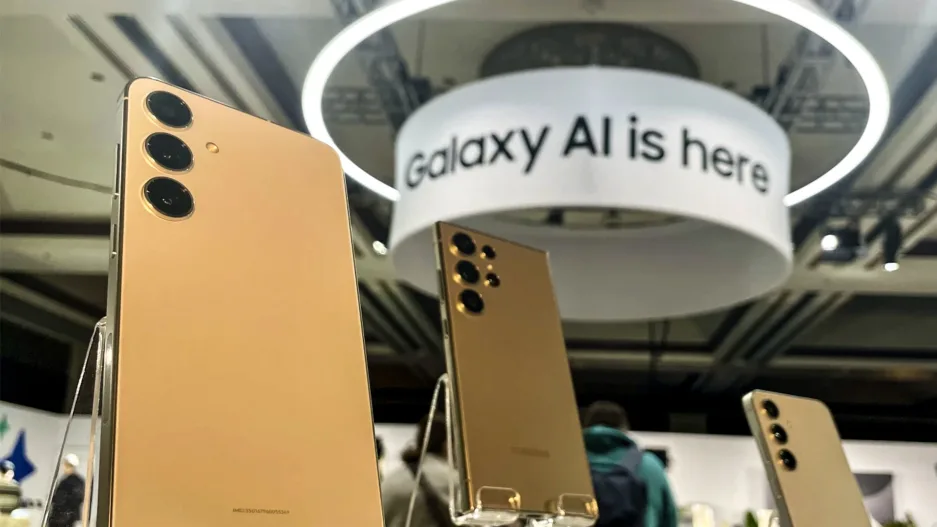Smartphones are poised to become significantly more intelligent in the coming year as the next wave of artificial intelligence permeates the devices that have become ubiquitous in people’s lives.
Samsung, the primary competitor to Apple and its iPhone, offered a sneak peek into the evolving landscape of smartphones during the unveiling of the next generation of its flagship Galaxy models on Wednesday.
The sales pitch for the Galaxy S24 lineup centers around a variety of new features powered by AI. “We are ushering in a new era where AI is taking center stage,” remarked Drew Blackard, Samsung’s vice president of mobile product management.
In addition to showcasing some of Samsung’s proprietary AI developments, the Galaxy S24 lineup will incorporate some of the latest advances from Google.
These technological enhancements will be accompanied by a higher price for Samsung’s top-of-the-line phone, the Galaxy S24 Ultra, which will be priced at $1,300—a $100 or 8% increase from last year’s comparable model. This mirrors a similar move made by Apple with its premium model, the iPhone 15 Pro Max, released in September.
Samsung is maintaining prices for the Galaxy S24 Plus, which will retail for $1,000, and the basic Galaxy S24, which will start at $800.
Scheduled to hit stores on January 31, all new Galaxy phones will feature substantially more AI capabilities, including live translation during phone calls in 13 languages and 17 dialects. The Galaxy S24 lineup will also introduce Google’s “Circle To Search” feature, allowing users to circle snippets of text, parts of photos, or videos using a digital stylus to obtain instant search results about the highlighted content.
These new Galaxy phones will also facilitate quick and easy ways to manipulate the appearance and placement of specific elements in pictures taken with the device’s camera. This feature could assist users in refining their photos while also making it simpler to create deceptive images.
Google initiated a push last fall to infuse its latest Pixel phones with more AI, including the ability to alter the appearance of photos. This effort was accelerated with the initial rollout of its next technological leap with Project Gemini at the end of last year. Google is also introducing the Circle To Search tool to its latest phones, the Pixel 8 and Pixel 8 Pro, with plans to expand it to other devices running on its Android software later this year.
In addition to introducing Circle To Search, Google is leveraging AI to enable users of its mobile app for iPhones and Android to point a camera at an object for a summary of what is being captured by the lens. While Google believes these features will enhance its results, executives acknowledge they may be prone to inaccuracies.
Samsung relies on Google’s Android operating system, aligning their interests, despite competition in the sale of mobile devices. Apple is expected to incorporate more AI into its next generation of iPhones in September, but Samsung has a head start, giving it an advantage in making the technology more ubiquitous, according to Forrester Research analyst Thomas Husson. Samsung ceded its position as the world’s largest seller of smartphones to Apple last year, according to the market research firm International Data Corp (IDC).
“Samsung’s marketing challenge is precisely to make the technology transparent to impress consumers with magic and invisible experiences,” said Husson.
The increasing integration of AI in smartphones follows OpenAI’s thrust of the technology into the mainstream last year with its ChatGPT bot, capable of quickly creating stories, memos, videos, and drawings upon request.
As AI becomes a more integral part of smartphones, the technology is likely to have broad implications on productivity, creativity, and privacy, according to Todd Lohr, U.S. technology consulting leader for KPMG.
“Intelligence is actually coming to your smartphone, which really haven’t been that smart,” Lohr said. “You may eventually see use cases where you could have your smartphone listen to you all day and have it provide a summary of your day at the end of it. That could create a challenge in the social construct because if everyone’s device is listening to everyone, whose data is it?”
While AI hasn’t reached that level of advancement yet, Samsung is already addressing privacy concerns related to the new technology rolling out in the Galaxy S24 lineup. Samsung executives emphasize that AI features can be kept on the device, although some applications may need to connect to data centers in the virtual cloud.
The South Korean company also assures users that on-device activity will be protected by its “Samsung Knox” security.
Michael Kokotajlo, KPMG’s digital transformation partner of telecommunications, believes Samsung and other smartphone makers are on their way to providing people with an “AI assistant in their pockets”—a concept that is expected to be more readily adopted by younger generations that have grown up during the mobile-computing era.
“Millennials and Gen Z are definitely going to be looking for these AI capabilities because they don’t have as much concern about privacy and security, but some of the older generations may have more concerns about that or how do you even leverage all of it,” Kokotajlo said.

